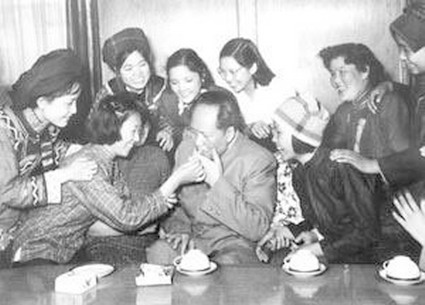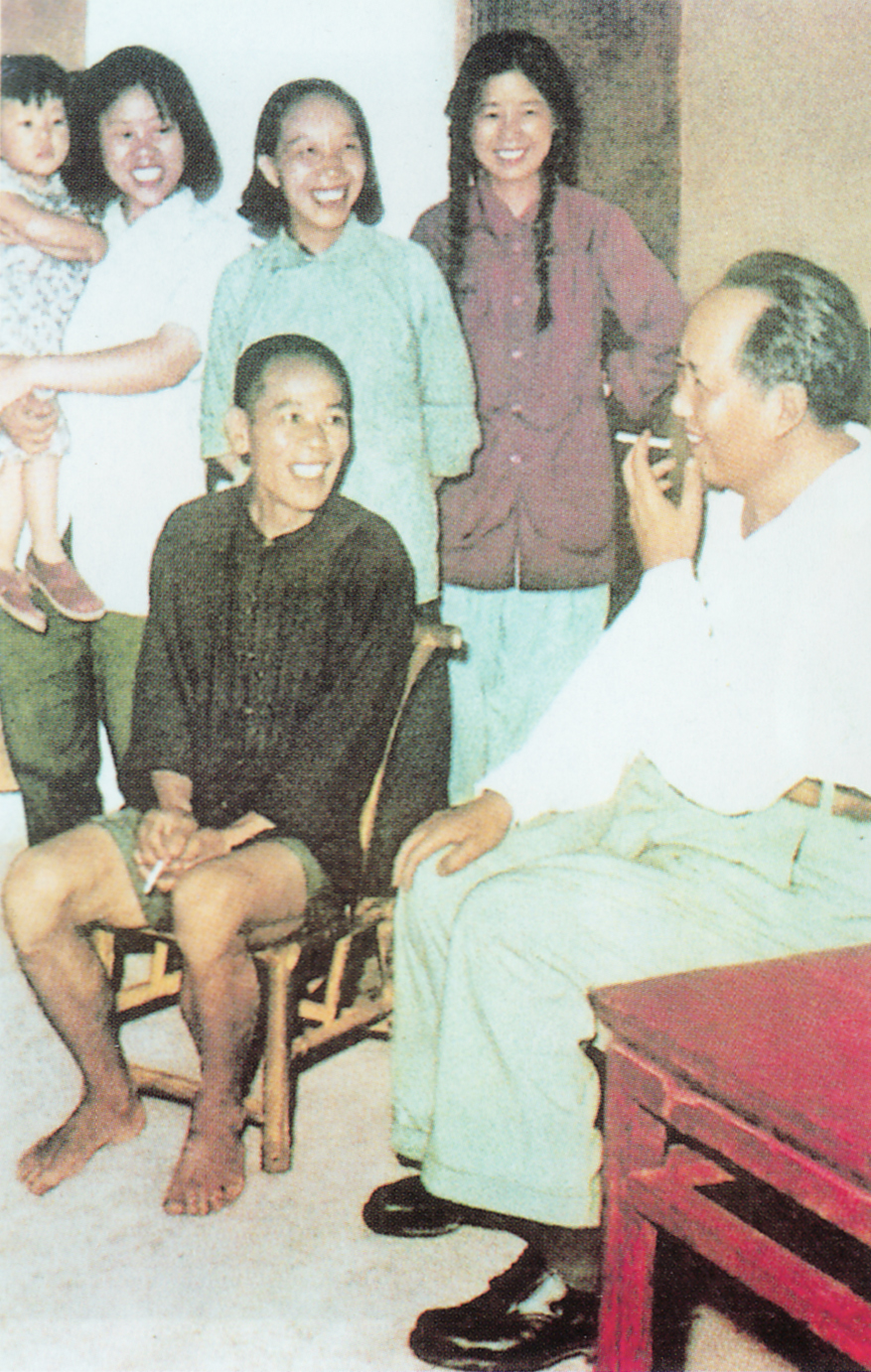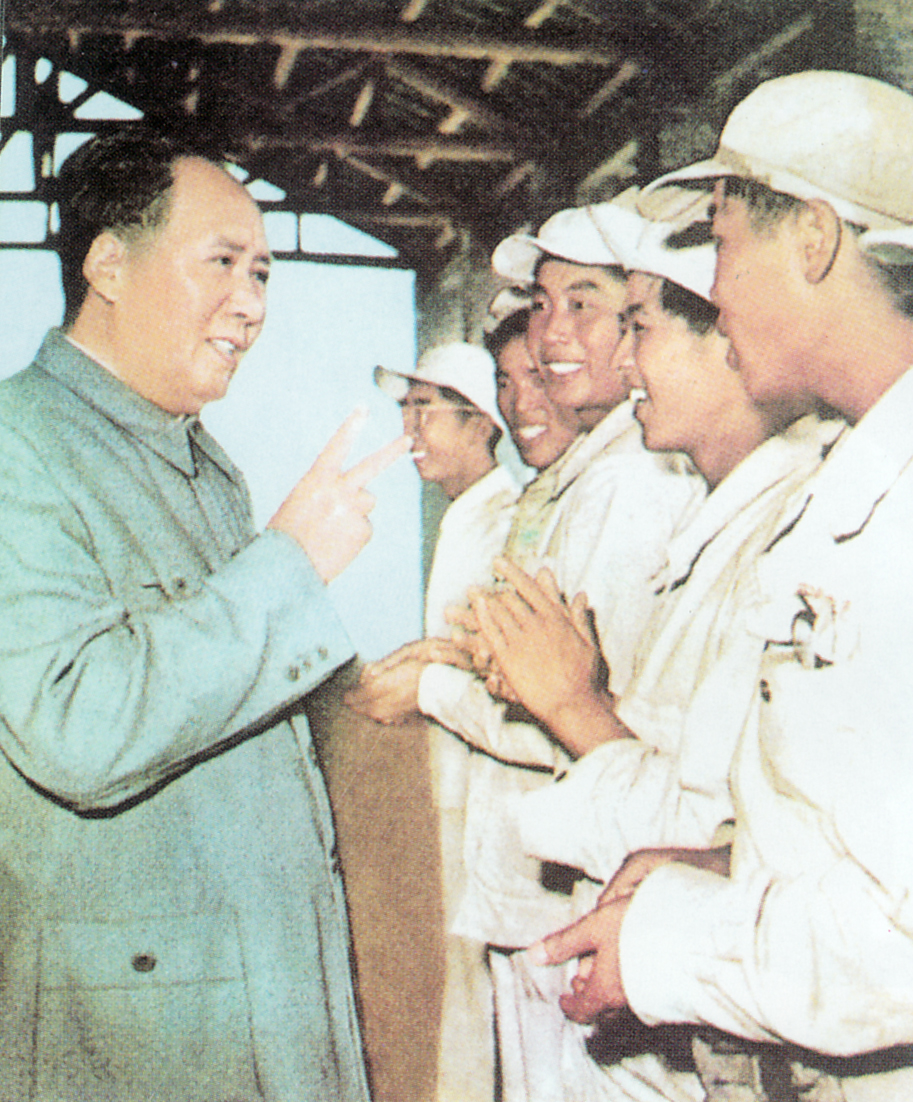
Mao Zedong in 1963. Photo by Unknown source- Wikimedia.
Top 13 Amazing Facts about Mao Zedong
*Originally published by Laura C on June 2022 and Updated by Vanessa R on May 2023
In the modern era, China is regarded as a global superpower. Who was most responsible for the rise of this powerful nation? Welcome to this article where we will be exploring Mao Zedong facts.
He was one of the world’s most powerful men and one of the People’s Republic of China’s pioneers. You may come across some facts that you have never heard before, as well as some that you are already aware of.
Mao Zedong remains a divisive figure to this day. His astute judgment and astute mind stimulated the reshaping of a mighty nation’s socio-political compositions while maintaining a brutal image.
1. He was a Chinese Communist dictator
Mao Zedong, the Chinese Communist dictator who established the People’s Republic of China in 1949. He is best known for uniting China and is responsible for the millions of deaths that occurred during his ruling.
Mao Zedong was born on December 26, 1893, in Shaoshan, Hunan Province, China, to Mao Yichang, a prosperous farmer, and Wen Qimei, a Buddhist. Mao Zedong’s father had a history of striking him and his siblings.
He married an older adolescent girl at the age of 14 in a marriage he never agreed to. He joined the Revolutionary Army and the Nationalist Party in 1911. He joined the Chinese Communist Party in 1921. His political aspirations grew, and he became the founding father of the People’s Republic of China in 1949.
2. Ambitions in politics
Mao was always interested in politics, so he read quite a lot and broadened his ideological opinions. He was greatly influenced by historical figures such as George Washington and Napoleon Bonaparte. Despite his love of learning, he was forced to drop out of school at the age of 13 to help his father with the family farm.
3. He explored different career paths

Photo of Mao Zedong sitting, published in “Quotations from Chairman Mao Tse-Tung.” Photo by: The People’s Republic of China Printing Office- Wikimedia.
Mao joined the Hunan revolutionary army as a cadet and served for six months. This eventually led to his preliminary appreciation for the army, which impacted his opinions for many years to come.
Following his army service, Mao worked in a number of fields, including a police academy, a soap-production school, and economics and law schools. He eventually graduated from Changsha’s First Provincial School in 1918, where he gained political experience by establishing student organizations.
The experience he gained Mao Zedong became a certified teacher. The most well-known of these was the New People’s Study Society, whose members would later join the future Chinese Communist Party.
4. He led the Chinese Communist Party (CCP)
Mao worked as a librarian’s assistant at Peking University, which proved to be a watershed moment in his life. This is where he met two men who would go on to play important roles in the CCP: Chen Duxiu and Li Dazhao. Mao went on to found a number of organizations that brought students and workers together. Finally, Mao established Marxism as the central philosophy of the Chinese Revolution in 1921.
5. He was considered a feminist

Mao Zedong with female representatives of Democracy Youth League of China (later renamed to the “Communist Youth League of China”) 3rd National Representative Conference, in 1957. Photo by: PRC government- Wikimedia.
While very few people are aware of this Mao Zedong fact, he was a strong supporter of gender equality and women’s rights. This was backed up by his famous quote, ‘Women hold half the sky!’ He worked on several constitutional amendments that would make it easier for women to vote. This included equal rights to education, equal job opportunities, and the right to inherit property.
6. Mao initiated the five-year ‘Great Leap Forward’ plan
Mao led this campaign from 1958 to 1962, with the goal of transforming the country from an agricultural-based economy to a socialist environment through industrial growth. Updates included the implementation of agricultural nationalization, the prohibition of private farming, the expansion of public struggle sessions, and so on. Unfortunately, this plan is thought to have implicated in the Great Chinese Famine, which killed tens of millions of people. The strategy also suffered a financial setback, which historians describe as “an expensive disaster.”
7. Mao had a large family

Photo of Mao Zedong visiting with a family, from Quotations from Chairman Mao Tse-Tung. Photo by: The People’s Republic of China Printing Office- Wikimedia.
Chairman Mao was married four times, had ten children, and was the grandfather of twelve grandchildren. His 28-year-old son, Anying, was among his children who died in the Korean War.
Numerous people wondered why he allowed his son to join the military, but Mao was thought to be too stubborn. Mao became so distraught after Anying’s death that he refused to eat or sleep, instead preferring to smoke and sit in silence.
It’s fascinating that Mao Zedong allowed his son to serve in the military. Few dictators put their sons in harm’s way.
8. He was strong till the very end
Mao maintained his authority until his death, even when he was physically weakened. He died on September 9, 1976, after suffering from a series of heart attacks. A lifetime of heavy smoking, as well as speculations of Parkinson’s Disease, are thought to have harmed his wellbeing.
Up to a million people flocked to Tiananmen Square to pay their respects during his funeral ceremonies. Chairman Mao’s embalmed body is publicly displayed in his burial site to this day.
9. He left a notable but dubious legacy

Photo of Mao Zedong with workers, from Quotations from Chairman Mao Tse-Tung The People’s Republic of China Printing Office. Photo by: Public domain- Wikimedia.
Mao remains a contentious figure to this day. His astute judgment and astute mind contributed to the reshaping of a powerful country’s sociopolitical structures, and he tirelessly fought injustice and inequalities. He was, regrettably, viewed as brutal and ruthless.
Mao Zedong left a complex legacy that is neither entirely positive nor entirely negative. On the one hand, Mao’s revolution established China’s sovereignty, and his land reforms provided land to a previously homeless people.
Mao, on the other hand, led an autocratic regime that suppressed dissent and subjected its people to years of terror, suffering, and famine. Some of his most reactionary policies, such as state-controlled media and the one-party system, have persisted in China.
The Chinese government’s official position on Mao is that his actions were laudable until the summer of 1957, when they became more difficult to justify.
10. Unimaginable death count
Mao Zedong’s legacy is still being debated today. He is commended with stabilizing China and significantly increasing both life expectancy and overall population.
Despite his accomplishments, his actions, ranging from the oppression of political opponents to his agricultural revolution that caused the Great Chinese Famine, resulted in the deaths of 40 to 70 million people, the highest death toll caused by a single person in human history.
11. He actually supported gender equality
Despite the fact that few people are aware of it, Mao Zedong was a passionate supporter of women’s rights and gender equality. His well-known statement, “Women hold half the sky!” added weight to this. He contributed to various constitutional amendments that would better accommodate women. Inheriting property was one of the equal rights that were included, along with the right to education and career possibilities.
12. Mao introduced his five-year “Great Leap Forward” agenda
Mao oversaw this programme from 1958 to 1962 with the intention of quickly industrialising the nation in order to change it from an economy based on agriculture to a socialist one.
The implementation of agricultural collectivization, the outlawing of private farming, the expansion of public struggle meetings, etc., were among the changes. Regrettably, it is believed that this strategy caused the Great Chinese Famine, which killed tens of millions of people. The idea experienced a financial catastrophe as well, and historians describe it as “an expensive tragedy.”
13. Mao ordered a campaign for rat tails
Mao implemented a variety of popular mobilisation campaigns during the 1950s to address these issues, promoting hand washing, street cleanliness, and the extermination of the “Four Pests”—flies, mosquitoes, sparrows, and rats. Shanghai families were forced to hand over one rat tail to the government each week as proof of their efforts.
50,000 rat tails per province were the limit set in Guangdong in 1952. A booming illegal market developed as a result of the political pressure to conform, and production fell as workers spent more time hunting down or even rearing rats for collecting.
I hope you learned something today from the article on Mao Zedong Facts.
Planning a trip to Paris ? Get ready !
These are?Amazon’s?best-selling?travel products that you may need for coming to Paris.
Bookstore
- The best travel book : Rick Steves – Paris 2023 –?
- Fodor’s Paris 2024 –?
Travel Gear
- Venture Pal Lightweight Backpack –?
- Samsonite Winfield 2 28″ Luggage –?
- Swig Savvy’s Stainless Steel Insulated Water Bottle?–?
We sometimes read this list just to find out what new travel products people are buying.











